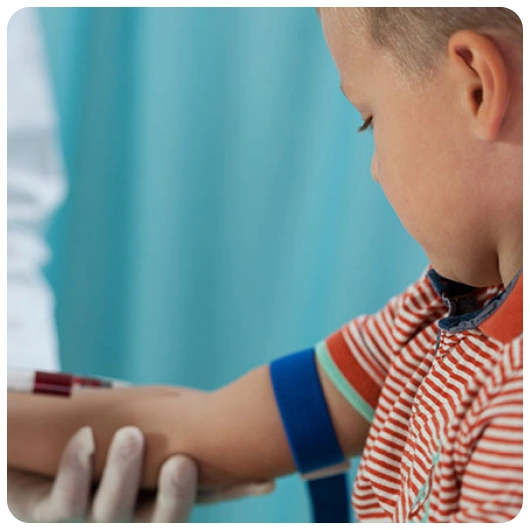Pediatric haematology-oncology encompasses a wide range of conditions affecting children and adolescents. This includes:
- Primary Immunodeficiency Diseases
- Solid Tumours
- Haematological Malignancies
- Non-Malignant Illnesses of Blood and Blood-Forming Tissues
Haematology is a subspecialty of medicine focusing on the study of blood, blood diseases, and the organs involved in producing blood. Haematologists and oncologists specialise in diagnosing, treating, and managing conditions such as:
- Leukaemias
- Lymphomas
- Brain Tumours
- Bone Tumours
- Solid Tumours
Hematology also investigates disorders of blood cells, including white, red, and platelets, clotting problems, and bleeding disorders.
Comprehensive Pediatric Haematology Care at Medicover Hospitals
Medicover Hospitals, the best pediatric haematology and oncology hospital, offers comprehensive care for various blood illnesses and conditions. With the top haematology and oncology doctors, we ensure top-tier treatment for your child's health needs. Our services encompass comprehensive pediatric haematology care for various blood illnesses and conditions, including:
- Anaemia
- Haemophilia
- Thalassemia
- Leukaemia
Experienced Team
The department is led by experienced hemato-oncologists and equipped with advanced facilities and technologies. This includes:
- Complete Blood Banks
- Specialist Pediatric Intensive Care Units
- Multidisciplinary Teams
Primary Research Areas in Haematology
The four primary research areas within haematology are:
- Hemoglobinopathy
- Hematologic Malignancies
- Anaemia
- Coagulopathy

Why Choose Medicover Woman and Child Hospitals




Frequently Asked Questions
What are the most common cancers in children?
Children between ages 0-14 often suffer from leukaemias, brain tumours, lymphomas, neuroblastoma, Wilms tumour, Retinoblastoma, bone and soft tissue cancers, and other common types of cancer.
What is the survival rate for paediatric cancer?
The relative survival rate for children under 15 is 58%, while for adolescents aged 15-19, it's 68%, and for adolescents, it's 86%, primarily due to therapy advancements.
What are the signs and symptoms that indicate pediatric cancer?
Cancer in children can cause persistent discomfort in areas like the belly, back, bones, joints, or legs, excessive bleeding in urine or stool, fever, rapid weight loss, constant tiredness, lumps, skin inflammation, vision changes, headaches, nausea, vomiting, and enlarged lymph nodes. These symptoms are unrelated to common illnesses and may also involve sudden vision changes or a rash of red dots on the skin.
What factors contribute to the development of pediatric cancer?
Childhood cancers have various causes, often unknown. Risk factors include genetics, environmental factors, persistent infections, radiation, toxins, viruses, past treatments like radiation and chemotherapy, developmental issues in the womb, immature physiological systems, and diet.
Why choose Medicover Hospitals for Pediatric Hematology & Oncology Services?
Medicover Hospitals offers comprehensive pediatric haematology care for various blood illnesses and conditions, including anaemia, haemophilia, thalassemia, and leukaemia.
Ready to take control of your journey to parenthood?
Book your Appointment and start your path towards Parenthood Today !